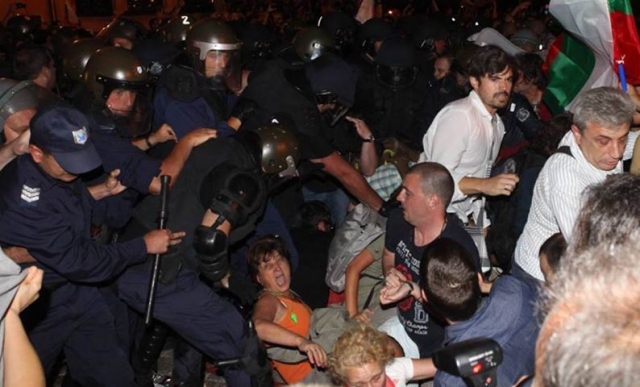Title photo: Vasil Garnizov
Anastasia Balezdrova
Nikolai Staikov is a journalist and a member of the Antigovernment press centre which, for several days already, has been holding press conferences, providing information about the protests. "The fact that such a slightly secretive organization is necessary is indicative of the situation of the media market in Bulgaria. Currently, the media are reminiscent of the characters of the classic novel by Aleko Konstantinov - Gochoolu, Dochoolu and Danko Hairsazinat who had gathered together to create a newspaper. This is a little funny when reading the book, but it is not when you are seeing it live.
"We are seeing media which are damaging the trust of their readers obviously not driven by a long-term media interest, we are seeing parties that are damaging their future obviously not driven by any ideals and principles. The media war is something that cannot be avoided and we have actually created a tool in this war."
It is like when you see that the future of the Bulgarian political system rests on the fact that someone has been able to buy certain media and create a media empire through dubious schemes and an unclear source of funds, which is not complying with any code of ethics.
We are seeing media which are damaging the trust of their readers obviously not driven by a long-term media interest, we are seeing parties that are damaging their future obviously not driven by any ideals and principles. The media war is something that cannot be avoided and we have actually created a tool in this war," Nikolai Staikov said in an interview for GRReporter, continuing to very closely monitor the developments in Bulgaria.
Mr Staikov, what happened outside the parliament building last night?
Between 5,000 and 8,000 people had gathered at different hours during the protest. They occupied the entire perimeter of the security zone of the parliament building, which is now quite expanded. This is precisely to prevent concentration of large numbers of people.
I would define the events as an emergency because the Bulgarian Parliament usually meets from 09:00 am to 3:00 pm. However, for the first time last night, there was information of meetings of two important commissions, namely of economic affairs and of budget and finance, which involved three ministers.
The information was available on the social networks and as a result, this afternoon session which started at 5:00 pm and lasted for about 2-3 hours, coincided with the already regular protest which usually takes place at the same time.
What happened last night was that the people were aware of the meetings and gathered around the parliament building from all sides although they are not connected with each other. The people had to go around the building a lot because all the small streets and lanes were closed. However, they knew from where the deputies would leave the building and had covered these points. They already have experience from previous attempts at a peaceful occupation of the parliament building.

Photo: Ladislav Tsvetkov
How did the clashes between the protesters and the police start?
According to recent data, the number of policemen in the security zone could reach 1,200. The number was much higher last night. When they saw that the people had surrounded the parliament building, they did not make another attempt to take out the deputies.
The clashes began during the first attempt to take out the deputies, shortly before 10:00 pm. The policemen opened the fence at the main entrance of the St. Alexander Nevsky Cathedral and, with the help of specialized police forces, tried to make way for two gendarmes trucks and a bus. They entered the area and tried to push the people to clear a corridor. The protesters did not want to allow this and, in addition, it was difficult to implement it in practice. Definitely, this was not the most appropriate course of action.
The first clashes began there since the people behind were pressing those in front of them and did not want to allow the clearing of the corridor. It was very difficult for the police forces to advance, there were people sitting on the ground and protesting peacefully. The policemen were pulling them aside and pushing away other people and people on bicycles. About 10 people were injured, if I am not mistaken.
What I wanted to explicitly point out is that the policemen guarding the parliament building and this vast security zone in the central part of Sofia are very tired and are in low spirits. I am saying this from the position of an active protester as I sometimes go to protest twice a day – in the morning, before I go to work and in the evening, when I finish work. I have spoken with many policemen. If this becomes a daily round, quite a lot of them are ready to leave their jobs. Many of the policemen who were hesitant are already fully convinced of their decision and some of them have already filed to leave their jobs. Policemen are human beings like all of us but exhaustion is already felt in their ranks which, in certain situations, could turn into some kind of aggression. Unfortunately, some of the protesters and policemen may have a more aggressive setting and when they confront each other the result is like last night. For me, this result of the decision to break through, in this way, thousands of people who were pressed by the people behind them and the policemen in front of them in such a small area was inevitable.